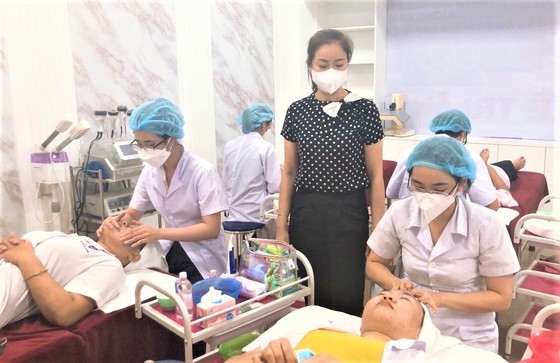 A lecturer of a vocational training school is teaching learners how to practice beauty care
A lecturer of a vocational training school is teaching learners how to practice beauty care
According to specialists in the field of employment, after a short time, learners can learn many complementary skills, increasing their chances of getting a good job.
Ho Chi Minh City-based Principal of Khoi Viet International School Tran Thanh Duc shared that the intermediate-level beauty care industry has a study period of 1.5 years while there are 3-6 month-training courses. Students will study basic beauty treatments for face, body, and nails, and make-up application techniques for the beauty salon such as spraying, embroidery, tattooing, skin care, nail art, makeup art, design and hairstyling.
After the training courses, hard-working students can easily find jobs at beauty salons or open their own service practice.
Spa and beauty salon services are becoming more popular among Vietnamese consumers. 25-year-old Nguyen Mai Tram, opening a spa shop on 3/2 Street in Ho Chi Minh City’s District 3, shared that her shop has been operating for five years. Previously, Ms. Tram studied style and beauty care at Nguyen Tat Thanh Intermediate School, then she participated in competitions to gain more experience. After more than a year, she opened her own shop.
Her shop currently has 15 beauticians, all of whom are officially trained from vocational schools in the city. Except for two years of the Covid-19 epidemic, the spa shop welcomed a lot of consumers from the beginning of 2022 until now. She revealed she can earn nearly VND100 million each month after excluding the cost of the premises, salary and bonus of employees.
Talking about the potential of the beauty care industry encompassing skin care, color cosmetics, hair care, fragrances, and personal care, Vice President of Ho Chi Minh City Vocational Education Association Tran Anh Tuan, an expert in human resource forecasting, said that beauty care is currently in great demand.
Across the country, there are hundreds of vocational training institutions in the field of beauty care. Ho Chi Minh City alone has about 50 training institutions with the need to enroll nearly 12,000 students per year, and all of the graduates have jobs immediately. Learners only need to study the elementary course for 3-6 months or study for 1.5 years, they have the skills to start a career with an income of VND8-VND20 million a person monthly.
According to Principal of Nguyen Tat Thanh Intermediate School Hoang Quoc Long, with the development of society plus heightened consciousness about good looks, the beauty industry has become one of the thriving professions.
Therefore, many establishments have not been licensed to open beauty care but still provide training illegally. At the same time, they also perform illicit spa and beauty salon services to earn profits, affecting the reputation and quality of training units in the field of beauty care in general.
Last time, the school received a request from the authorities to support and verify whether the certificate embryo was properly issued by the school or not, because it was related to a beauty care service facility to cause an aesthetic incident. Through checking, the school confirmed the fake certificate isn’t issued by the school, said Mr. Hoang Quoc Long.
To deter people from breaching the regulations, Mr. Long suggested responsible agencies must take strong measures to punish training institutions that do not comply with regulations in order to help learners and society feel secure and trust in vocational training.
Ms. Do Thi Thiet, in charge of the Central Medical School in Ho Chi Minh City, also expected management agencies to take tougher measures to ensure fairness in training activities in the field of beauty care.
According to Ms. Do Thi Thiet, there should be a separation between the operation of the training institution and the establishment that provides beauty care services. If these establishments don’t follow the regulation, they must receive stiff penalties.
Leaders of many other vocational schools also requested to tighten the management and handle them harshly to deter enterprises and unauthorized training organizations from affecting vocational education activities.
At the same time, they proposed that the Department of Labor, War Invalids and Social Affairs of Ho Chi Minh City need to invest in and upgrade the website of the vocational education portal of the industry so that learners who need information can quickly look up and choose the right school.
On the other hand, it is necessary to study the establishment of a center for accrediting the quality of training professions, because in addition to certificates, learners wishing to participate in the exam at the center to be assessed for competence, thereby also reducing the status of training institutions not in accordance with regulations.
























